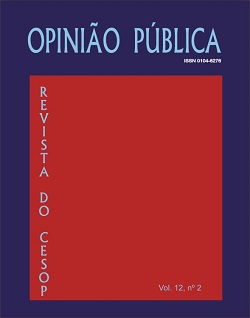Abstract
A Bolívia passou por um grande processo de reforma institucional desde seu retorno à democracia, em 1982, reconhecido internacionalmente como um dos mais profundos da América Latina. Apesar de todos os esforços do Estado boliviano para aperfeiçoar e modernizar suas instituições, e apesar das reformas bem sucedidas em setores fundamentais do governo, a Bolívia tem um dos níveis mais baixos de confiança nas instituições dos países latino-americanos e os dados mostram indícios de que a confiança nas instituições políticas tende a diminuir com o tempo. Ao mesmo tempo, a Bolívia é o país mais pobre da América do Sul; tem os graus mais altos de corrupção na administração pública e, nos últimos anos, um ambiente político cada vez mais instável. Há indícios de que os efeitos de uma polarização regional de interesses, as percepções negativas da situação econômica e da corrupção e níveis baixos de conhecimento político da população boliviana sejam preditores confiáveis dos baixos níveis de confiança institucional que consistentemente encobrem a melhoria do desempenho institucional dos governos bolivianos.
Abstract
Bolivia has undergone a deep process of institutional reform since its return to democracy in 1982 that is recognized internationally as one of the deepest in the Latin American region. Despite all the efforts of the Bolivian state to improve and modernize its institutions, Bolivia has one of the lowest levels of institutional trust among Latin American countries and data show evidence that trust in political institutions tends to decrease over time. At the same time, Bolivia is the poorest country in South America; it has high levels of corruption in the public administration and in the last years an increasingly unstable political environment. Evidence indicates that the effects of a regional polarization of interests, the negative perceptions of the economic situation and of corruption and low levels of political knowledge among the Bolivian population are reliable predictors of low levels of institutional trust that consistently overshadow the accomplishments of Bolivian governments in improving their institutional performances.
Key words: institutional trust, regional interests, economic situation, Bolivia
References
ABRAMSON, P. R.; FINIFTER, A. W. On the meaning of political trust: new evidence from items introduced in 1978. American Journal of Political Science, v. 25, n. 2, p. 297-307, 1981.
CITRIN, J. Democracy and trust. Political Psychology, v. 23, n. 2, p. 402-04, 2002.
CITRIN, J. Comment: the political relevance of trust in government. The American Political Science Review, v. 68, n. 3, p. 973-88, 1974.
EASTON, D. A systems analysis of political life. Nova York: Wiley, 1965.
EASTON, D. A re-assessment of the concept of political support. British Journal of Political Science, v. 5, p. 435-57, 1975.
GARSON, D. Factor analysis general concepts. North Carolina State University.
HETHERINGTON, M. J. Why trust matters. Declining political trust and the demise of american liberalism. Princeton: Princeton University Press, 2005.
LIPSET, S. M. Political man: the social basis of politics. Ed. Ampl. Baltimore: Johns Hopkins University Press, 1981.
MILLER, A. H. Political issues and trust in government: 1964-1970. The American Political Science Review, v. 68, n. 3, p. 951-72, 1974.
MISHLER, W.; ROSE, R. Trust, distrust and skepticism: popular evaluations of civil and political institutions in post-communist societies. The Journal of Politics, v. 59, n. 2, p. 418-51, 1997.
MOORE, D. W. Just one question: the myth and mythology of trust in government. Public Perspective, 2002.
SCHWARZ-BLUM, V. Confianza en las instituciones: por que es necesaria?. ed. Daniel Moreno. Cochabamba: USAID Bolivia, 2006.
SELIGSON, M. A. Trust, efficacy and modes of political participation: a study of Costa Rican peasants.” British Journal of Political Science, v. 10, p. 75-98, 1980.
SELIGSON, M. A. On the measurement of diffuse support: some evidence from Mexico. Social Indicators Research, v. 12, p. 1-24, 1983.
SELIGSON, M. A. Latin american legislatures: an overview of Bolivia, Chile and Peru. Pittsburgh: University of Pittsburgh Latin American Democratization Study Group, 1989.
SELIGSON, M. A. The political culture of democracy in Bolivia: 1998. La Paz, Bolivia: USAID/LAPOP 1998.
SELIGSON, M. A. La cultura política de la democracia boliviana. La Paz: Encuestas & Estudios, 1999a.
SELIGSON, M. A. Popular support for regional economic integration in Latin America. Journal of Latin American Studies, v. 31, part 1, p. 129-50, 1999b.
SELIGSON, M. A. Auditoria de la Democracia: Bolivia 2002. La Paz: USAID, 2003.
SELIGSON, M. A.; AMES, B.; PEREZ-LIÑAN, A.; MORENO-MORALES, D. Elites, Instituciones y el público: una nueva mirada a la democracia boliviana. La Paz: Pittsburg University/USAID, 2004a.
SELIGSON, M. A.; MORENO-MORALES, D.; CATSAM, M.; LOTZ, A. Auditoria de la Democracia Ecuador 2004. Quito: Vanderbilt University/CEDATOS, 2004b.
SELIGSON, M. A.; MORENO-MORALES, D.; SCHWARZ-BLUM, V. Auditoria de la democracia: informe Bolivia 2004. La Paz: USAID/ Vanderbilt University, 2005a.
TUCKER, L. R.; MACCALLUM, R. Exploratory Factor Analysis. 1997. Disponível em: <http://www.unc.edu/~rcm/book/factornew.htm>.
WEATHERFORD, M. S. Measuring political legitimacy. American Political Science Review, v. 86, n. 1, p. 149-66, 1992.
A Opinião Pública utiliza a licença do Creative Commons (CC), preservando assim, a integridade dos artigos em ambiente de acesso aberto.

